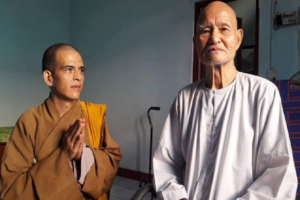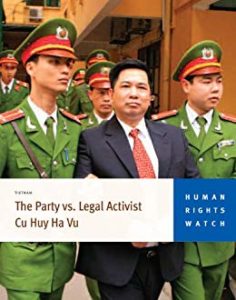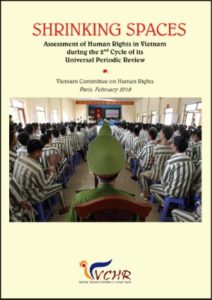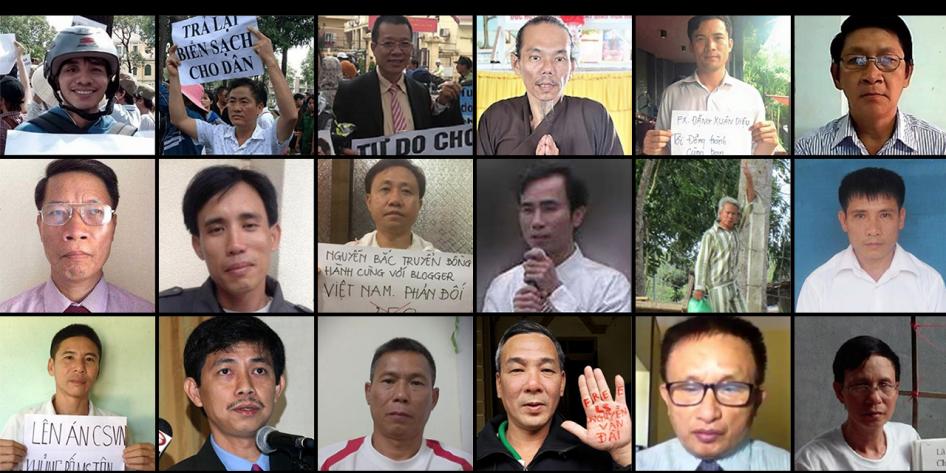Thich Quang Do, a dissident Buddhist monk who has effectively been under house arrest since 2003 and was nominated multiple times for the Nobel Peace Prize, has died. Head of the banned Unified Buddhist Church of Vietnam, the vocal patriarch was born in 1928 in Thai Binh province and spent most of his life advocating for religious freedom and human rights in communist-run Vietnam, AFP reports:
His staunch activism landed him under what was effectively house arrest in 2003 in Ho Chi Minh City, where he was under constant surveillance. …Do has long been a thorn on the side for communist-run Vietnam, and he has been nominated multiple times for the Nobel Peace Prize for his vocal advocacy for democracy.
In 2001, he wrote an “Appeal for Democracy” and also called on northern and southern dissidents to drop their cultural differences and unite in 2005. He received Norway’s Rafto human rights award the following year for “his personal courage and perseverance through three decades of peaceful opposition against the communist regime in Vietnam.”
“We have lost a brave monk who accompanied us on our fight for religious freedom, democracy and human rights for the nation,” the Interfaith Council of Vietnam said in a statement.

Photo courtesy of Thich Ngo Chanh’s Facebook.
“Thich Quang Do was admired by freedom-loving people around the world, and they mourn his passing,” said National Endowment for Democracy President Carl Gershman. “He was an example for all humanity of tolerance, compassion, and devotion to human rights and dignity. He suffered greatly for his courage and his unyielding commitment to principle and truth.”
The European Union (EU) should use its human rights dialogue with Vietnam to demand an end to its crackdown on civil society, the amendment of repressive laws, and the immediate release of all political prisoners, said FIDH (International Federation for Human Rights) and its member organization Vietnam Committee on Human Rights (VCHR). In a new briefing paper released last week, FIDH and VCHR detailed their human rights concerns in six key areas: 1) Escalating crackdown on dissent; 2) Repressive “national security” laws; 3) Labor rights; 4) Land disputes; 5) Inhumane prison conditions and deaths in custody; and 6) The death penalty.
At least 30 activists and dissidents were sentenced to prison in Vietnam in 2019 simply for exercising their fundamental rights to freedom of expression, association, and religion, Human Rights Watch said in its recently released World Report 2020. The group released a submission calling on the European Union to press Vietnam to end its systemic repression of human rights and release political prisoners and detainees.
 In one notable incident in November 2019, the authorities detained a journalist, Pham Chi Dung, and charged him with “making, storing, disseminating or propagandizing information, materials and products that aim to oppose the State of the Socialist Republic of Vietnam,” most likely in connection to an overture he made to the European Parliament about Vietnam’s abysmal rights record. He is one among hundreds of activists who are harassed, prosecuted, and convicted for peacefully exercising their right to freedom of expression, including on social media, Human Rights Watch adds.
In one notable incident in November 2019, the authorities detained a journalist, Pham Chi Dung, and charged him with “making, storing, disseminating or propagandizing information, materials and products that aim to oppose the State of the Socialist Republic of Vietnam,” most likely in connection to an overture he made to the European Parliament about Vietnam’s abysmal rights record. He is one among hundreds of activists who are harassed, prosecuted, and convicted for peacefully exercising their right to freedom of expression, including on social media, Human Rights Watch adds.
Pham Chi Dung also sent a Video Message to the Vietnam Committee on Human Rights, which co-sponsored a conference on “Human Rights and the EU-Vietnam Free Trade Agreement (EVFTA)” with MEP Julie Ward (S&D Group) and Christian Solidarity Worldwide (CSW). VCHR Vice-Chair Penelope Faulkner said that EVFTA had “a distinct air of déja vu” over more than two decades of EU-Vietnam trade relations. “For the first agreement, we were hopeful. For the second, we were doubtful. For EVFTA, we are plainly not convinced”, she told MEPs.
Vietnam’s human rights situation continues to deteriorate despite regular dialogues between Hanoi and Western nations, analyst and former political prisoner Ha Hoang Hop told RFA’s Vietnamese Service. While Vietnam signed the Universal Declaration on Human Rights in 2007, its government has failed to live up to its obligations, despite monitoring by the international community.
 “However, from 2007 onward, over the course of many years of evaluation by the United Nations Human Rights Council and international organizations, Vietnam has done little to improve its rights record.”
“However, from 2007 onward, over the course of many years of evaluation by the United Nations Human Rights Council and international organizations, Vietnam has done little to improve its rights record.”
There are several possible explanations for why repression has been on the rise in Vietnam, notes one observer.
Vietnam is a one-party state, dominated for decades by the ruling Communist Party of Vietnam (CPV), adds Freedom house. Although some independent candidates are technically allowed to run in legislative elections, most are banned in practice. Freedom of expression, religious freedom, and civil society activism are tightly restricted.
The UBVC has been banned since the early 1980s, when it refused to join the state-sanctioned Vietnam Buddhist Church, AFP adds. The U.S. Commission on International Religious Freedom recommended to the State Department that Vietnam be designated as a “country of particular concern,” citing “systematic, ongoing, egregious violations of religious freedom.”

Human Rights Watch







